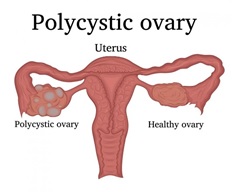
Causes, Symptoms, and Treatment.
Do you know that 80% of infertility cases in women are caused by ovulation abnormalities and PCOS is a major cause?
September is PCOS awareness month and this is a perfect time to create awareness on this condition that affects one in every ten women.
PCOS is a very common condition that affects women of childbearing age; it can also contribute to disease conditions like Type 2 diabetes.
This condition is called a syndrome because it is characterised by a group of symptoms.
What causes PCOS?
The cause is not exactly known but it has been said to be hereditary, it could also be due to insulin resistance (this means the cells in the body are not using insulin properly)
SYMPTOMS OF PCOS
If you have two or more of these symptoms, then you may have PCOS. You however have to rule out the fact that these symptoms are not caused by another condition.

Infertility Irregular periods – these could be absent, infrequent or unpredictable periods,
Excess male hormone (Androgen)
Poor Egg quality Obesity, severe acne, and oily skin
Hirsutism – excess hair growth on the face, chest, back, and abdomen – places where they shouldn’t be in the first place
Multiple small fluid-filled sacs in the ovaries (can be found through an ultrasound)
CAN PCOS BE TREATED?
Yes, it can be treated. PCOS treatment mainly helps induce ovulation, improve insulin levels or treat symptoms like hair growth or acne.
PCOS AND INFERTILITY
PCOS is a common cause of infertility. Infact, some women only find out they have it due to their inability to conceive.
This is how it works – women who do not ovulate cannot conceive and not ovulating means she is not releasing enough eggs to be fertilised, this thus makes it harder for her to get pregnant.
HOW IS PCOS TREATED IN WOMEN NOT TRYING TO GET PREGNANT?
If your goal is not to get pregnant, hormone medications are usually prescribed to correct your PCOS symptoms. Oral contraceptive pills are often taken to reduce unwanted hair growth and acne, they also make menstrual periods more regular and prevent pregnancy. Weight loss is also recommended because it lowers the risk of diabetes and androgen levels in women with PCOS.
It is usually advisable to talk with a specialised doctor to find the best approach for you. At Nisa Premier Hospital, treatments are tailored to each woman’s needs and symptoms.
PCOS AND OBESITY
Weight gain is one of the risk factors of polycystic ovarian syndrome. If a woman living with PCOS is overweight, losing weight can help improve her ovulation patterns and fertility. Insulin-sensitising medications can help the body use insulin more effectively to improve ovulation in some patients with PCOS. This may also lower the risk of developing diabetes or metabolic syndrome.
There is no definitive test for the diagnosis for Polycystic Ovarian Syndrome, your doctor might recommend a pelvic examination, some blood tests and an ultrasound scan. Your doctor will recommend treatments based on your individual concerns.
